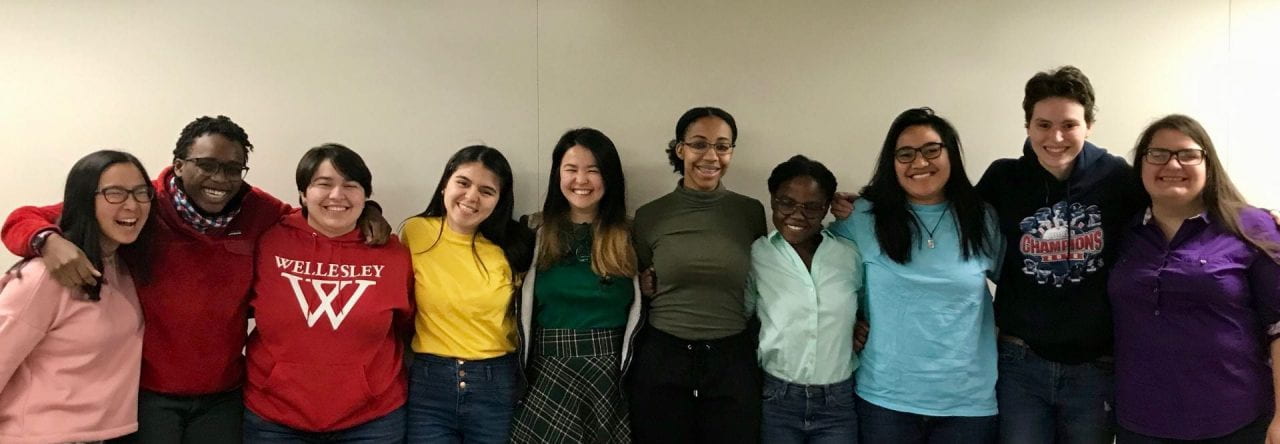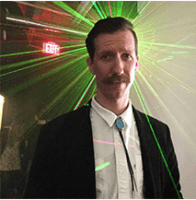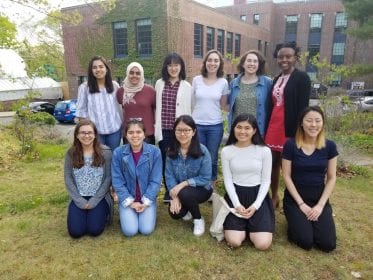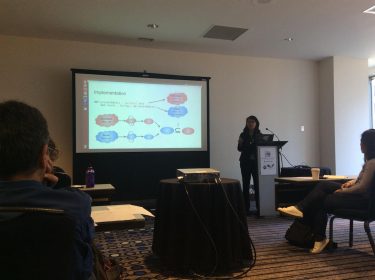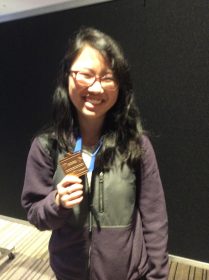CS faculty member Jordan Tynes is highlighted in the Wellesley News for his work advancing technology on campus.
Category: Faculty/Staff (Page 1 of 5)
Takis Metaxas, Professor of CS and faculty director of the Madeleine Korbel Albright Institute for Global Affairs, is featured on the College’s daily shot describing his work with the nonprofit research institute Project Information Literacy for his work on How Students Engage with News: Five Takeaways for Educators, Journalists, and Librarians.
With the start of the Fall 2018 semester, the Wellesley Computer Science Department is (belatedly) delighted to welcome and re-welcome 5 new and continuing faculty.
Our continuing colleague  Christine Bassem, Assistant Professor of Computer Science, initially joined Wellesley as a Lecturer in Computer Science after completing her PhD at Boston University in 2015. Her current research interest is on the design and analysis of incentive-compatible mechanisms for socially-aware networking, specifically in the domains of crowd sensing and opportunistic networks. She enjoys reading, doodling, and spending time with her family.
Christine Bassem, Assistant Professor of Computer Science, initially joined Wellesley as a Lecturer in Computer Science after completing her PhD at Boston University in 2015. Her current research interest is on the design and analysis of incentive-compatible mechanisms for socially-aware networking, specifically in the domains of crowd sensing and opportunistic networks. She enjoys reading, doodling, and spending time with her family.
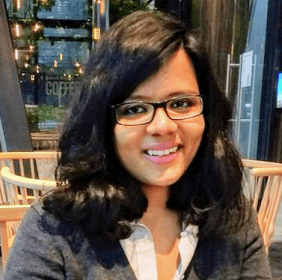 Shikha Singh, Assistant Professor of Computer Science, is a theoretical computer scientist who does research in the area of algorithmic game theory and algorithms for big data. As part of her dissertation research, she worked extensively on designing mechanisms for incentivizing correct behavior from service providers in internet marketplaces. Shikha is also interested in the area of online algorithms, secure data structures, combinatorial optimization and complexity theory. Her research work has been recognized by multiple fellowships such as the John Marburger III Fellowship for Science, Engineering, and Mathematics, Chateaubriand Fellowship and Renaissance Technology Fellowship. Shikha joins us from Stony Brook University where she completed her PhD. She is teaching CS235 this fall. Come say hi to Shikha in SCI E114.
Shikha Singh, Assistant Professor of Computer Science, is a theoretical computer scientist who does research in the area of algorithmic game theory and algorithms for big data. As part of her dissertation research, she worked extensively on designing mechanisms for incentivizing correct behavior from service providers in internet marketplaces. Shikha is also interested in the area of online algorithms, secure data structures, combinatorial optimization and complexity theory. Her research work has been recognized by multiple fellowships such as the John Marburger III Fellowship for Science, Engineering, and Mathematics, Chateaubriand Fellowship and Renaissance Technology Fellowship. Shikha joins us from Stony Brook University where she completed her PhD. She is teaching CS235 this fall. Come say hi to Shikha in SCI E114.
 Andrew Davis, Lecture in Computer Science, examines the relationships between computer science and music. Trained as a composer, Andrew’s research looks at how computer coding can be used to digitally create music. His background is in music where he earned a PhD in music composition from the University of Pennsylvania. Most recently he completed his graduate work in computer science from Stanford University. This semester, Andrew is excited to be teaching CS111!
Andrew Davis, Lecture in Computer Science, examines the relationships between computer science and music. Trained as a composer, Andrew’s research looks at how computer coding can be used to digitally create music. His background is in music where he earned a PhD in music composition from the University of Pennsylvania. Most recently he completed his graduate work in computer science from Stanford University. This semester, Andrew is excited to be teaching CS111!
 Peter Mawhorter, Instructor in the Computer Science Laboratory, does research on generative AI, with a special focus on computational narrative and implicit generative algorithms. His work overlaps with psychology, cognitive science, and literature, and part of his dissertation developed a theory of choice poetics. He comes to Wellesley from MIT, where he did a postdoc studying virtual identity systems, and before that from Pomona College, where he was a visiting professor for a year, and from UC Santa Cruz, where he got his PhD. Peter is teaching labs for CS 111 and CS 115 in both the Fall and Spring semesters this year, and you can stop by his office to say hi at SCI E128.
Peter Mawhorter, Instructor in the Computer Science Laboratory, does research on generative AI, with a special focus on computational narrative and implicit generative algorithms. His work overlaps with psychology, cognitive science, and literature, and part of his dissertation developed a theory of choice poetics. He comes to Wellesley from MIT, where he did a postdoc studying virtual identity systems, and before that from Pomona College, where he was a visiting professor for a year, and from UC Santa Cruz, where he got his PhD. Peter is teaching labs for CS 111 and CS 115 in both the Fall and Spring semesters this year, and you can stop by his office to say hi at SCI E128.
 Sam McCauley joins us during the Fall 2018 semester as a Postdoctoral Fellow. He completed his PhD at Stony Brook University, and attended Tufts University as an undergraduate. Sam is interested in algorithms and data structures, particularly in problems that come up when querying large databases. He focuses largely on external-memory algorithms, data structures for similarity search, and scheduling algorithms. Part of what he finds exciting about these areas is that structural insights from theory can lead to significant speedup in practice. Sam is teaching CS 115 this fall.
Sam McCauley joins us during the Fall 2018 semester as a Postdoctoral Fellow. He completed his PhD at Stony Brook University, and attended Tufts University as an undergraduate. Sam is interested in algorithms and data structures, particularly in problems that come up when querying large databases. He focuses largely on external-memory algorithms, data structures for similarity search, and scheduling algorithms. Part of what he finds exciting about these areas is that structural insights from theory can lead to significant speedup in practice. Sam is teaching CS 115 this fall.
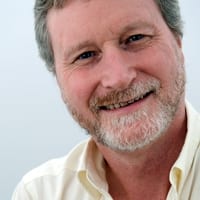 Professor Randy Shull, heart and soul of the CS Department at Wellesley, has retired after nearly 40 years at the College. Randy joined the Math Department in 1980 and moved to the CS Department in 1984. He led the department’s early development and chaired the department numerous times. He taught thousands of students in a broad range of CS courses, and he helped hire every current faculty member in the department. To countless people, Randy served as an advisor, colleague, teacher, mentor, and friend. And in every case, he did so with warmth, wisdom, and excellence. We will miss you Randy!
Professor Randy Shull, heart and soul of the CS Department at Wellesley, has retired after nearly 40 years at the College. Randy joined the Math Department in 1980 and moved to the CS Department in 1984. He led the department’s early development and chaired the department numerous times. He taught thousands of students in a broad range of CS courses, and he helped hire every current faculty member in the department. To countless people, Randy served as an advisor, colleague, teacher, mentor, and friend. And in every case, he did so with warmth, wisdom, and excellence. We will miss you Randy!
Over the summer in 2018, A shley DeFlumere, former Lecturer in Computer Science at Wellesley, moved on to Ireland, where she has joined Intel Labs as a research scientist. Ashley is missed around the department at Wellesley, where she taught CS 230 Data Structures, CS 240 Foundations of Computer Systems, and a course on her research area: Scientific and Parallel Computing, not to mention helping to anchor the department’s extracurricular activities. Behind the scenes, she also led the foundation and development of peer mentoring and tutor training programs which have become valuable additions in CS courses. Best wishes!
shley DeFlumere, former Lecturer in Computer Science at Wellesley, moved on to Ireland, where she has joined Intel Labs as a research scientist. Ashley is missed around the department at Wellesley, where she taught CS 230 Data Structures, CS 240 Foundations of Computer Systems, and a course on her research area: Scientific and Parallel Computing, not to mention helping to anchor the department’s extracurricular activities. Behind the scenes, she also led the foundation and development of peer mentoring and tutor training programs which have become valuable additions in CS courses. Best wishes!
Lip Sync veterans Jean Herbst and Eni Mustafaraj returned to the 2018 SCI Faculty Lip Sync with new stars Cibele Freire and Scott Anderson, introducing their latest hit, New Rules, a collaboration with Do a Loopa. See how many CS references you can pick up in their subtle lyric engineering and moves!
Assistant Professor of Computer Science Eni Mustafaraj was awarded the highly competitive National Science Foundation CAREER grant for early-career faculty in support of her work on “Signals for Evaluating the Credibility of Web Sources and Advancing Web Literacy.” The 5-year $460,610 grant will support Eni’s work with several student researchers under her leadership in the Wellesley Cred Lab.
Eni’s project will identify and implement signals about online sources that will help users assess their credibility (should you believe what this source is writing about climate science or gender equality?) These signals can be used to augment search results, for example in Google. A concrete example in one of Eni’s blog posts uses the metaphor of “nutrition labels” to explain this augmentation.
Christine Bassem, Lecturer in Computer Science, has been awarded a National Science Foundation grant to study “Mobility Coordination of the Crowds in Mobile Crowd Sensing Platforms.” The grant of $154,434 will support Christine’s work with student researchers on the intersection of algorithms, systems, mobile computing, and social computing.
Coordinated mobility depends on two areas: the mechanisms via which tasks/routes are assigned to agents; and the mechanisms via which agents are compensated for conformance, creating a rich set of problems in the fields of optimization problems, graph and data mining, and crowd economics. This project contributes towards the advancement of mobile crowd sensing for solving larger problems, with a great impact on smart cities initiatives, and the advancement of Internet of Things solutions.
Ada presented their recent paper, “Rewriting History: Changing the Archived Web from the Present” at ACM CCS 2017 in Dallas, TX in early November. In this paper, Ada studied web archives, which are websites such as the Wayback Machine that allow anyone on the web to time travel and see what the web looked like decades ago. Through analysis of the design of web archives and their interactions with other web technologies, this paper demonstrated a number of techniques by which malicious parties could modify the web of the past, injecting their own deceptive content so that anyone visiting a web archive will see not the historical contents of the pages they view, but an attacker’s deceptive content. The work was performed with attention to ethics, and the results were disclosed to the staff at the Wayback Machine, who quickly deployed several effective defenses against the vulnerabilities discovered, giving this paper real world impact.

The website of Wellesley College Circa 2000. You can visit it live at: http://web.archive.org/web/20000304134343/http://www.wellesley.edu:80/
Valerie Zhao ’18 and Ben Wood participated in SPLASH 2017, the ACM SIGPLAN Conference on Systems, Programming Languages, Applications: Software for Humanity, in Vancouver, BC, in late October. SPLASH is an umbrella for several conferences and workshops in the area of programming languages.
Valerie won 3rd prize in the undergraduate category of the Student Research Competition, where she presented a poster and talk on her summer research work, Abstracting Resource Effects, undertaken at Carnegie Mellon University with Darya Melicher, Jonathan Aldrich, and Alex Potanin. Valerie’s collaborator Darya Melicher, a PhD student at CMU, presented more of their work at the OCAP workshop. Their work introduces a novel effect system that supports rigorous checking of how programs use system resources in a security-focused programming language.
Ben gave a talk on his OOPSLA paper, Instrumentation Bias for Dynamic Data Race Detection, with collaborators from Google, The Ohio State University, and the University of Washington. Their work introduced a software system for accurately detecting data races, a problematic type of concurrent programming error. The analysis helps eliminate a source of performance overhead in error detection by exploiting properties of common program patterns.
Earlier in October, Ben’s collaborator gave a talk on their paper, PARSNIP: Performant Architecture for Race Safety with No Impact on Precision, at the 50th ACM/IEEE Symposium on Microarchitecture (MICRO), in Cambridge. This work, with collaborators at U. Penn, designed efficient hardware support for data race detection that, combined with software techniques, could eventually provide always-on concurrency error detection much like modern memory-safe languages provide explicit runtime exceptions for null dereferences or array bounds errors.
